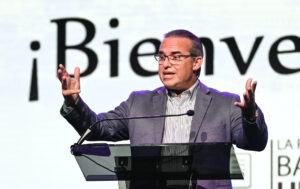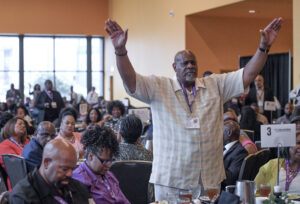
NASHVILLE, Tenn. (BP)–The Catholic University of America is taking the rare and perhaps unprecedented step of returning to single-sex dorms.
The Washington Post reports the university’s president, John Garvey, hopes the change will cut down on the binge drinking and promiscuous sex he believes are made easier by co-ed dorms.
“We just thought it was a more wholesome environment,” Garvey told the Post. “A little separation is a healthy thing.”
In an opinion piece for The Wall Street Journal, Garvey acknowledged that the new policy is “countercultural” and that 90 percent of college students live in co-ed housing. But he painted a bleak picture of the status quo on today’s campuses.
“Christopher Kaczor at Loyola Marymount points to a surprising number of studies showing that students in co-ed dorms (41.5 percent) report weekly binge drinking more than twice as often as students in single-sex housing (17.6 percent),” Garvey wrote. “Similarly, students in co-ed housing are more likely (55.7 percent) than students in single-sex dorms (36.8 percent) to have had a sexual partner in the last year — and more than twice as likely to have had three or more.”
Binge drinking, Garvey wrote, makes students 25 times more susceptible to problems like falling behind in school, getting in trouble with the law and unplanned sexual activity, not to mention the abuse and troubles binge drinkers inflict upon other students.
Garvey was similarly critical toward the increased sexual activity correlating with co-ed dorms.
“Rates of depression reach 20 percent for young women who have had two or more sexual partners in the last year, almost double the rate for women who have had none,” Garvey wrote. “Sexually active young men do more poorly than abstainers in their academic work. And as we have always admonished our own children, sex on these terms is destructive of love and marriage.”
The Post reported that although Catholic University puts men and women in co-ed dorms on different floors or wings and enforces “visiting hours,” Garvey said “there’s a lot of circulation between the floors” and that he had not heard any genuine benefits of co-ed dorms.
Not everyone is happy with the change; the Post reported that a group of former students is preparing a joint letter to Garvey explaining the benefits they found in co-ed housing.
Nevertheless, the Post reported, the university will place most freshmen in single-sex dorms this fall, followed by sophomore halls the next school year and then upperclassmen halls.
“The change will probably cost more money,” Garvey wrote in the Journal. “There are a few architectural adjustments. We won’t be able to let the ratio of men and women we admit into the freshman class vary from year to year with the size and quality of the pools. But our students will be better off.”
‘JUST SAY NO’ NOT AMISH TECH POLICY — The Amish people, long known for eschewing modern conveniences and driving horse-drawn buggies, don’t reject technology as universally as some may think.
Eric Brende, who left a Massachusetts Institute of Technology Ph.D. program to live in an Amish community for more than a year, told CNN that Amish communities are not a monolithic bloc regarding technology.
“There is a patchwork of communities — and there so many of them which are so radically different from each other,” Brende told CNN.
Brende said religious leaders for each Amish community make the rules for their community, and those leaders determine what technologies are allowed. One of the most important factors in deciding whether to admit a new technology is if it strengthens or weakens community cohesion.
Cars can dilute the quality of relationships in a community by allowing contact with a wider group of people, resulting in more — but shallower — relationships, Brende explained. Phones can allow community members to listen in on each others’ conversations, leading to gossip.
“It’s quite clear that Amish groups that monitor technology in a discerning way — with an eye to its effects on the community in the long run — do last longer and have more cohesion in their community,” Brende said, adding that the group he lived with was cautious regarding technology and saw very little attrition, while some Amish groups adopted cars early on and watched their groups shrink or disappear entirely.
Amish communities — even technology-cautious ones like his — struggle between trying to keep their communities together and needing to keep up with the outside world for selling their goods, Brende said.
“So, kind of while holding their nose, the group that I was with continued to allow the use of the phone under limited circumstances, particularly so their representatives could keep in touch with the produce distributors, because they supplied major grocery stores in the area with a lot of their produce,” Brende said.
The Amish once practiced advanced agricultural techniques and were recruited by European nobility to farm difficult-to-work land, Brende noted. “They were ahead of the game,” he said. “In this day and age, the reason it’s the opposite is because their goal has stayed the same. Their goal is to promote cohesiveness of the group and advance that group’s prospects over time.”
ATHEISTS PROTEST ‘HEAVEN’ STREET SIGN — A group of atheists in New York City want the city to take down a street sign honoring seven firefighters killed during the Sept. 11, 2001 terrorist attacks — because the sign includes the word “heaven.”
Fox News Radio reported the atheists contend the sign for “Seven in Heaven Way” — dedicated outside the Brooklyn firehouse where the firefighters served — violates the separation of church and state.
“There should be no signage or displays of religious nature in the public domain,” Ken Bronstein, president of New York City Atheists, told Fox. “It’s really insulting to us.
“We’ve concluded as atheists there is no heaven and there’s no hell,” Bronstein said. “And it’s a totally religious statement. It’s a question of separation of church and state.”
Bill Donahue, president of the Catholic League, condemned the criticism of the sign, telling Fox the complaints are driven by more than just fear of Christianity.
“There’s a deep-seated visceral hatred of religion and particularly Christianity,” Donahue said. “That’s what’s driving this because most people who are not believers wouldn’t blink an eye at this.”
David Silverman, president of American Atheists, agreed with the atheist critics of the street sign, telling Fox that heaven is a specifically Christian place, and the city is wrong to imply that it exists.
“All memorials for fallen heroes should celebrate the diversity of our country and should be secular in nature,” Silverman said. “These heroes might have been Jews, they might have been atheists, I don’t know but either way it’s wrong for the city to say they’re in heaven. It’s preachy.”
Silverman told Fox he is not opposed to honoring the firefighters but does not believe they should be remembered in a way that violates the Constitution. Bronstein told Fox he may consider a lawsuit if the city does not remove the sign — something the city said it has no intention of doing.
–30–
John Evans is a freelance writer in Houston.















